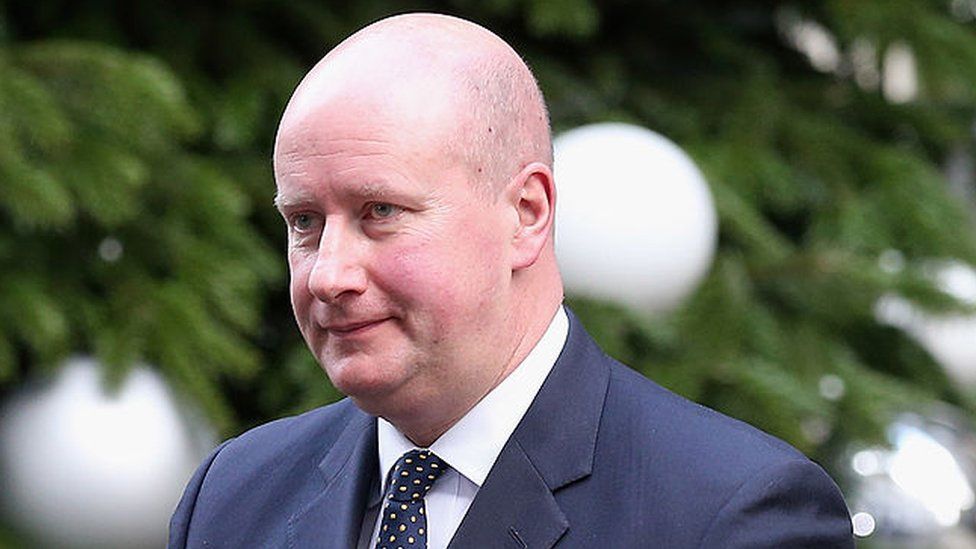Lord Geidt tells Boris Johnson why he felt he could not continue as his standards adviser.
 Image source, Getty Images
Image source, Getty ImagesBoris Johnson’s ethics adviser says he quit after the PM forced him into an “impossible and odious” position.
Lord Geidt’s job was to advise the PM on the ministerial code – a set of rules governing standards of behaviour.
In his resignation letter, he said he had come close to quitting over Covid law-breaking in Downing Street.
But he said he had been asked for advice this week on another issue he believed would amount to a deliberate breach of the code.
“This request has placed me in an impossible and odious position,” wrote Lord Geidt in his letter.
He said the idea that the prime minister “might to any degree be in the business of deliberately breaching his own code is an affront” that would suspend the code “to suit a political end”.
“This would make a mockery not only of respect for the code but licence the suspension of its provisions in governing the conduct of Her Majesty’s ministers,” Lord Geidt wrote.
“I can have no part in this.”
In his response, Mr Johnson said his intention was to seek Lord Geidt’s “advice on the national interest in protecting a crucial industry”.
Downing Street said Mr Johnson was reviewing whether or not to fill the vacant position, and declined to comment on suggestions the plan related to maintaining tariffs on Chinese steel despite possibly breaching World Trade Organisation (WTO) commitments.

Image source, Sue Gray report
Lord Geidt is the second ethics adviser to quit under Mr Johnson’s premiership.
Sir Alex Allan – who resigned from the role in 2020 – said it was “dreadful that an honourable man like Lord Geidt has been placed in a position where he felt he had no option but to resign”.
He told BBC Newscast that he understood Lord Geidt resigned over a “combination of the issues”, including breaches of Covid rules in Downing Street during the pandemic.
Sir Alex said “this particular issue about ministers, potentially at any rate, deliberately breaching the code” was the “final straw” for Lord Geidt.
But Chief Secretary to the Treasury, Simon Clarke, insisted the issue over which Lord Geidt resigned was one in which the government was “trying to do its best to support a British industrial sector” and nothing to do “with a personal ethics or conduct issue”.
Labour’s shadow attorney general Emily Thornberry said the resignation of Alex Allen and now Lord Geidt showed there was “something really rotten at the heart of Downing Street”.
This video can not be played
To play this video you need to enable JavaScript in your browser.
She told reporters Lord Geidt was a “man at the end of his tether” who had realised it’s “not possible” to defend the prime minister and had “had enough”.
Liberal Democrat leader Sir Ed Davey said Parliament should be allowed to vet the next ethics adviser “so that Johnson can’t simply appoint one of his cronies”.
The SNP MP Brendan O’Hara said the resignation was “another humiliation for the prime minister”.
In his resignation letter, Lord Geidt expresses concern about the prime minister’s reaction to widespread Covid rule-breaking in Downing Street, as highlighted in Sue Gray’s report.
He says he had decided it was possible to “continue credibly” as the PM’s adviser “albeit by a very small margin”.

The final straw?

So it really was a trade issue that triggered Lord Geidt’s resignation.
The PM’s now ex-ethics adviser stunned Westminster on Wednesday night by suddenly announcing his resignation, without explanation.
It took No 10 by surprise – who found out when the BBC approached them for comment.
He is known to have been unhappy about Boris Johnson’s handling of Partygate, and had suggested the PM may have broken the ministerial code.
And he had just endured a grilling by MPs over that very issue.
In his letter, Lord Geidt also strongly hints at his discontent over the prime minister’s leadership – and apparent attempt to shift the blame on to him for not making his concerns clear enough by citing ‘miscommunication’ between their offices.
There was some scepticism when ministers suggested he had gone because of a confidential issue in the national interest, which was magnified by Downing Street’s apparent reluctance to publish his resignation letter.
Now that the letter has been published, it appears a trade question was the final straw, but many questions remain.

In response to Lord Geidt’s letter, the prime minister said he had asked about a potential future decision related to the Trade Remedies Authorities.
He added the proposal would be in line with “domestic law but might be seen to conflict with our obligations under the WTO [World Trade Organisation]”.
By seeking Lord Geidt’s advice, Mr Johnson said he wanted to “ensure that we acted properly”.

Where does the World Trade Organisation come into it?

The Trade Remedies Authority (TRA) is a relatively new body, established after Brexit to decide whether action needed to be taken to protect UK industries.
Its first big decision, which was on the steel industry, was overruled by the government, which decided to protect 15 steel products when the authority had recommended only 10.
The measures made it more expensive for British companies to buy more than a certain amount of foreign steel. In a statement, the TRA said the letter “appears to refer” to this case.
Now, one reading of Mr Johnson’s letter is that ministers suggested taking steps to protect a British industry that were so clearly in breach of World Trade Organization rules and international law that Lord Geidt felt he had to resign.
But it is not entirely clear how this could have happened.
WTO rules can be unclear. Generally, a country does something, another country complains and some time later the WTO will rule on whether its rules have been broken.
You wouldn’t necessarily expect ministers to resign if the WTO ruled against them.
But also, Lord Geidt’s predecessor Sir Alex Allan didn’t resign when the government introduced the Internal Market Bill, which Northern Ireland Secretary Brandon Lewis conceded would break international law in a “specific and limited way” in September 2020.
And the European Commission thinks the UK is breaking international law by not carrying out its obligations under the Northern Ireland Protocol.

Lord Geidt’s job involved providing advice to Mr Johnson about the ministerial code. He could also investigate ministers for breaching the code – but only if asked to do so by the prime minister.
The code, which outlines the rules ministers must follow, says there is an “overarching duty” on them to comply with the law. If the code is broken, ministers are expected to resign.
This video can not be played
